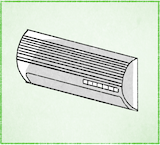
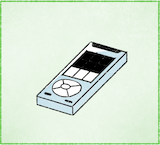
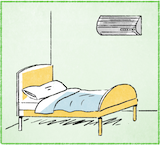
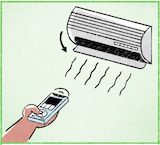
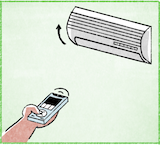
นี้คืออี่หยัง นี้คือแอ
แอมีไว้เฮ็ดหญัง แอมีไว้ถ้าเฮ็ดให้อากาดเย็น
แอเอาไว้ใส แอเอาไว้ในห้อง แอเอาไว้ในห้องนอนหลือเอาไว้ในบ้านกะได้
แอมีลาคาแพงบ่ แพงอยู่ แอมีลาคาแพง แต่กะบ่แพงคัก
แอมันเฮ็ดให้เปียงไฟบ่ เปียงอยู่ แอมันเฮ็ดให้เปียงไฟหลาย
2
นี้คืออี่หยัง นี้คือลีโหมดแอ
ลีโหมดแอมีไว้เฮ็ดหญัง ลีโหมดแอมีไว้ถ้าเปิดหลือปิดแอ
ลีโหมดแอสำคันบ่ สำคันอยู่ ลีโหมดแอสำคันหลาย ขั้นบ่มีลีโหมดแอกะเปิดปิดแอบ่ได้
ลีโหมดแอใซ้งานได้หลายอย่างบ่ ใซ้ได้อยู่ ลีโหมดแอสามาดใซ้งานกับแอได้หลายอย่าง สิตั้งเวลาปิดแอ หลือตั้งเวลาเปิดแอ หลือเพิ้มความเย็น หลือลดความเย็นกะได้
ลีโหมดแออันใหญ่บ่ บ่ ลีโหมดแออันบ่ใหญ่ ลีโหมดแออันพอดี บ่น้อยหลาย บ่ใหญ่หลาย
3
นี้คืออี่หยัง นี้คือห้องนอน
ห้องนอนมีไว้เฮ็ดหญัง ห้องนอนมีไว้ถ้านอน
ห้องนอนมีหญังแน่ ห้องนอนมีแอ ห้องนอนมีเตียงนอน ห้องนอนมีผ้าห่ม ห้องนอนมีหมอน ห้องนอนมีอีกหลายๆ อย่างที่ห้องสามาดเอาไว้ได้นั้นได้
4
เขากำลังเฮ็ดหญัง เขากำลังเปิดแอ
เขาเปิดแอจั่งใด เขาใซ้มือของเขากดลีโหมดแล้วกะเปิดแอ
เป็นหญังเขาคือเปิดแอ เขาอาดสิฮ้อน เขาอยากสิให้อากาดในห้องของเขาเย็น เขากะเลยเปิดแอ
ขั้นเขาเปิดแอแล้ว มันสิเย็นบ่ เย็นอยู่ มันสิเย็นหลาย ขั้นเปิดแอแล้วมันสิเย็น
5
เขากำลังเฮ็ดหญัง เขากำลังปิดแอ
เขาปิดแอจั่งใด เขาใซ้มือของเขากดลีโหมดแล้วกะปิดแอ
เป็นหญังเขาคือปิดแอ เขาอาดสิหนาว เขาอาดสิบ่ใซ้งาน หลือเขาสิอาดไปข้างนอกกะได้ เขาเลยปิดแอ
ขั้นเขาปิดแอแล้ว แอมันสิใซ้งานอีกบ่ บ่ ขั้นแอปิดแล้ว เคี่ยงแอมันกะสิปิด เคี่ยงแอมันกะสิดับ แอกะสิบ่ได้ทำงานอีก
Link to overview page
Link to dictionary
| Isaan | Pronunciation | Tones | Thai | English/Notes |
|---|---|---|---|---|
| นี้ | ni: | HF | นี้ | 1. this 2. here |
| คือ | khʉ: | HR | คือ | 1. to be, to resemble, like, as 2. why {บักหล้าคือบ่เก็บโต่ะแน่ = [addressing a young boy] Why haven't you cleared the table?} |
| อี่หยัง | i:-yaŋ | H-M | อะไร | 1. what {นี้คืออี่หยัง = What is this?} {มื้อนี้เจ้าเฮ็ดอี่หยัง = What are you doing today?} {กินเข้างายกับอี่หยัง = What did you have for breakfast?} 2. something, anything, (in negations) nothing {บ่ต้องเฮ็ดอี่หยังอีกเลยนอกจากใส่ปุย = [we] don't need to do anything besides adding fertilizer} |
| แอ | ɛ: | M | แอร์ | A/C |
| มี | mi: | HR | มี | 1. to have 2. there is |
| ไว้ | wai | HF | ไว้ | 1. to keep, to put, to place, to retain, to save, to reserve {เขาเอาหัวของเขาไว้ใส = Where does she put her head?} {หมาสิเลี้ยงไว้บ้าน = dogs are kept/raised in the house} {ไก่เลี้ยงไว้ในคอก = chicken are kept/raised in a coop} {หน้ามันบังไว้ = the face is covered/not visible} {เขาเอาโทละสับวางไว้หู = he holds the phone to his ear} 2. for {นาลิกาปุกมีไว้เฮ็ดหญัง = What is an alarm clock for?} {หม้อเอาไว้เฮ็ดแนวกิน = a pot is used to make food} {ก่องเอาไว้เฮ็ดหญัง ก่องเอาไว้ใส่ของ = What is the box for? It's for putting in stuff.} Notes: see also ไว้ถ้า |
| เฮ็ด | het | H | ทำ | to do, to make |
| หญัง | ɲaŋ | M | อะไร, เป็นหญัง = ทำไม | 1. what {เขากำลังเฮ็ดหญัง = What is he doing?} {ธูปเอาไว้เฮ็ดหญัง = What are incense sticks for?} 2. something, anything, (nothing) 3. เป็นหญัง[...]คือ in initial position: why {เป็นหญังเขาคือใส่บักพิกลงไปในกวยเตียว = Why is he putting chili in [his] noodle soup?} {เป็นหญังหน้าต่างมันคือเปิด = Why is the window open?} {เป็นหญังมันคือมีควนไฟ = Why is there smoke?} |
| ไว้ถ้า | wai-tha: | HF-LF | usually in a positive statement or answer: is for, is used for, has the purpose of {กะทะมีไว้ถ้าทอด = a pan is for frying} {น้ำบักนาวมีไว้ถ้าปุงอาหาน = lime juice is used to season food} {ปากกามีไว้ถ้าเขียน = a pen is for writing} {กะเทียมเอาไว้ถ้าเฮ็ดแนวกิน = garlic is used to make food} {ขาเอาไว้ถ้าญ่าง = legs are for walking} {เกิบเอาไว้ถ้าใส่ = shoes are for wearing} Notes: see also ไว้ |
|
| ให้ | hai | LF | ให้ | 1. to give {หมอกำลังเอายาให้คนป่วยกิน = the doctor is giving the patient medicine} 2. for 3. to allow, to be allowed |
| อากาด | a:-ga:t | M-LF | อากาศ | 1. weather, climate 2. air |
| เย็น | yen | M | เย็น | cold, cool (air, objects) |
| เอา | ao | M | เอา | to take, to give {เขากำลังเอาก่องไปซั่ง = he's taking the boxes to weigh them} {หมอกำลังเอายาให้คนป่วยกิน = the doctor is giving medicine to the patient} {เอาไว้ถ้า = is for, is used for, has the purpose of} |
| ใส | sai | M | (ที่)ไหน | 1. where? {สิไปใส = Where are [you] going?} {มาแต่ใส = Where are [you] coming from?} {กะทะอยู่ใส = Where's the pan?} 2. somewhere, anywhere {ใสกะได้ = anywhere, wherever you like} |
| ใน | nai | HR | ใน | in, within |
| ห้อง | hɔŋ | LF | ห้อง | room |
| ห้องนอน | hɔŋ-nɔ:n | LF-HR | ห้องนอน | bedroom |
| หลือ | lʉ: | M | หรือ | or |
| บ้าน | ba:n | HF | บ้าน | 1. house, home 2. village (also used as a prefix before the name of a village) 3. home country, home region {บ้านเฮาเฮ็ดเข้าจั่งใด = How do we plant rice in Isaan/Thailand?} |
| กะ | ga | M | ก็ | 1. then, consequently 2. also |
| ได้ | dai | HF | ได้ | 1. can 2. to get, to obtain 3. before verb: indicating past tense 4. บ่ได้ + verb: not |
| ลาคา | la:-kha: | HR-HR | ราคา | price |
| แพง | phɛ:ŋ | HR | แพง | 1. expensive 2. dear |
| บ่ | bɔ: | H | ไม่ | 1. no, not 2. question particle, transforming a statement into a question Notes: spelling exception in line with common usage on social media |
| อยู่ | yu: | H | อยู่ | 1. to be (located) at 2. yet, still 3. auxiliary indicating continuous or progressive action {ทอดปาอยู่ในกะทะ = (in the process of) frying a fish in the pan} {แม่กำลังเมี้ยนเฮียนอยู่ = mother is cleaning/tidying up the house} |
| แต่ | tɛ: | H | แต่ | 1. but {แต่บ่ต่างกันหลาย = but not very different} {แต่บ่ลู้ว่าเขาญ่างมาแต่ใส = but [I] don't know where he's coming from, see also: แต่ว่า} 2. only {ตอนนี้มีแต่ขี้ฝ้า = now there are only clouds} |
| คัก | khak | H | intensifier: very, very much | |
| มัน | man | HR | มัน | it (also used to refer to people) |
| เปียง | pi:aŋ | M | เปลือง | to waste |
| ไฟ | fai | HR | ไฟ | 1. fire, flame 2. electricity, power 3. light |
| หลาย | la:i | M | เยอะ, มาก | many, much, very |
| ลีโหมด | li:-mo:t | HR-LF | รีโมท | remote control (of A/C, TV etc.) |
| เปิด | pə:t | M | เปิด | 1. to open {เปิดหน้าต่าง = to open the window} {เปิดปะตู = to open the door} 2. to start, to switch on {เปิดไฟ = to switch on the light} {เปิดแอ = to switch on the A/C} |
| ปิด | pit | M | ปิด | 1. to close {ปิดปะตู = to close the door} {ปิดก่อกน้ำ = to close the tap} 2. to finish, to switch off {ปิดไฟ = to switch off the light} {ปิดวิทะยุ = to switch off the radio} |
| สำคัน | sam-khan | M-HR | สำคัญ | important |
| ขั้น | khan | LF | เมื่อ | when, if |
| ใซ้งาน | sai-ŋa:n | HF-HR | ใช้งาน | to use, to put to use |
| อย่าง | ya:ŋ | H | อย่าง | type, kind, sort, category |
| ใซ้ | sai | HF | ใช้ | to use |
| สามาด | sa:-ma:t | M-HF | สามารถ | can, to be able |
| กับ | gap | M | กับ | 1. and {ลุงกับป้า = uncle and aunt} {กวยเตียวหมูกับกวยเตียวไก่ = noodle soup with pork and noodle soup with chicken} 2. with, to {ค้ายๆ กับคำว่า ... = similar to the word ...} 3. prefix in front of foods {กับเข้า = side dishes eaten with rice} {เขากินกับกวยเตียว = he's eating noodle soup} |
| สิ | si | M | จะ | future tense auxiliary {เขากำลังสิตื่น = he's about to wake up} {สิไปตะหลาด = [I'm] going to the market} |
| ตั้ง | taŋ | HF | ตั้ง | to set/put up, to install, to establish, to erect {เขาตั้งนาลิกาปุกตอนสองโมงเซ้า = he sets the alarm clock to eight o'clock in the morning} {พัดลมตั้งโต่ะ = table fan} {ทะนาคานมันสิไปตั้งไว้อยู่ซู่หม้องเอาโลด = banks are [established/can be found] everywhere!} {ตั้งไฟ = to set up a fire} |
| เวลา | we:-la: | HR-HR | เวลา | time, period |
| เพิ้ม | phə:m | HF | เพิ่ม | 1. to add, to increase 2. plus |
| ความเย็น | khwa:m-yen | HR-M | ความเย็น | coldness, coolness |
| ลด | lot | H | ลด | to reduce, to lower, to decrease |
| อัน | an | M | อัน | 1. thing, object 2. general clf. for objects |
| ใหญ่ | ɲai | H | ใหญ่ | large, big |
| พอดี | phɔ:-di: | HR-M | พอดี | 1. to fit well 2. appropriate, just enough, just right {กะจกบานบ่ใหญ่ กะจกบานพอดี = not a large window, just right} {พอดีมือของเฮา = just right for his hand} 3. just in time, at the right moment, just this moment {แล้วพุซายคนนี้กะญ่างมาพอดี = and the man has come just now} |
| น้อย | nɔ:i | HF | น้อย | 1. few, little 2. small |
| นอน | nɔ:n | HR | นอน | 1. to lie down 2. to sleep |
| แน่ | nɛ: | H | แน่, บ้าง | 1. some, somewhat 2. final particle, used to ask for examples (similar to Thai บ้าง at the end of a question) {หม้อใซ้เฮ็ดอี่หยังได้แน่ = What (different things) can a pot be used for?} {น้ำอัดลมซื้อได้อยู่ใสแน่ = Where/in which places can one buy soft drinks?} 3. final particle, when giving examples {มีเทิงส้งแน่ มีเสี้ยแน่ มีเกิบแน่ = there are trousers, shirts, shoes etc.} 4. final particle, used to give a command {ไปปิดหน้าต่างให้แน่ = Close the window!} 5. final particle, acting as an intensifier, especially in the pattern ... คัก ... แน่ {สูงคักสูงแน่ = very high} {ญ้องเฮาคัก ญ้องเฮาแน่ = [he's] praising me a lot} |
| เตียง | ti:aŋ | M | เตียง | bed |
| ผ้าห่ม | pha:-hom | LF-H | ผ้าห่ม | blanket |
| หมอน | mɔ:n | M | หมอน | pillow |
| อีก | i:k | LF | อีก | 1. more, again 2. other, another |
| ที่ | thi: | H | ที่ | 1. that, which {คนที่ยืนอยู่ฝั่งขวา = the person which is standing on the right = the person standing on the right} {เว้าคำที่บ่สุพาบ = to speak words which are impolite = to speak impolitely} 2. for ordinal numbers {ที่สาม = third} |
| นั้น | nan | HF | นั้น | that, there |
| เขา | khao | M | เขา | personal pronoun: he, she |
| กำลัง | gam-laŋ | M-HR | กำลัง | auxiliary indicating continuous or progressive action |
| จั่งใด | jaŋ-dai | H-M | ยังไง, แบบไหน | how, in what manner {บักนาวมันมีลดซาดจั่งใด = Lime fruits have what kind of taste?} {เขาปิดแอจั่งใด = How is he switching off the A/C?} {เทียนใซ้จั่งใด = How's a candle used?} {สิใซ้จั่งใด = how is [it] used?} |
| มือ | mʉ: | HR | มือ | 1. hand 2. front leg/paw (e.g., of a cat) |
| ของ | khɔ:ŋ | M | ของ | of, belonging to |
| กด | got | M | กด | 1. to push, to press (down) {กดปุ่ม = to push a button} 2. to withdraw [money] {กดเงิน = to withdraw money} |
| แล้ว | lɛ:o | HF | แล้ว | 1. finished 2. already 3. and then, and next (especially แล้วกะ) 4. auxiliary for past tense |
| เป็น | pen | M | เป็น | 1. to be, to exist 2. to be able to 3. to suffer, sth. happens to 4. เป็นหญัง[...]คือ in initial position: why? {เป็นหญังเขากะคือแปงฟัน = Why is he brushing his teeth?} {เป็นหญังเคี่ยงบินมันคือสิตก = Why is the airplane falling down?} |
| อาด | a:t | LF | อาจ | 1. might, may, will 2. likely |
| ฮ้อน | hɔ:n | HF | ร้อน | hot |
| อยาก | ya:k | LF | อยาก | to want, to wish |
| เลย | lə:i | HR | เลย | 1. futher on, beyond, past {เข็มน้อยเลยเลขสิบสองไป = the minute hand has passed number twelve} 2. too much 3. at all 4. definitively 5. completely, utterly |
| หนาว | na:o | M | หนาว | cold, chilly (personal sensation) |
| ไป | pai | M | ไป | 1. to go 2. auxiliary indicating action extending into the future |
| ข้างนอก | kha:ŋ-nɔ:k | LF-HF | ข้างนอก | outside |
| เคี่ยง | khi:aŋ | H | เครื่อง | 1. machine, engine 2. clf. for machines, airplanes, electronic devices etc. Notes: pronunciation: also realized as เคื่อง |
| ดับ | dap | M | ดับ | 1. inactive, out (light, electronic device) 2. to extinguish (e.g., a fire, smell etc.) {ดับไฟ = to extinguish a fire} {ลดดับเพิง = fire truck} |
| ทำงาน | tham-ŋa:n | HR-HR | ทำงาน | to work |